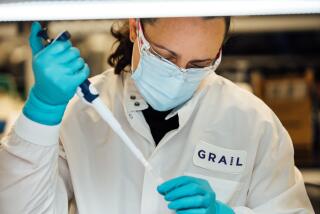Letters Call CompuSave Retail Devices Defective : Stock Falls After Smear Campaign
- Share via
A secret war being waged against CompuSave Corp. broke into the open Thursday when the Irvine maker of electronic shopping terminals blamed an unknown letter writer for a severe dip in the company’s stock price the day before.
In heavy volume of 107,000 shares Wednesday, CompuSave stock, which is traded over the counter, fell $1.25 a share to $3.75. At the close of trading Thursday, CompuSave stock sold for $4 a share. Volume for the day slowed to 65,700.
The letters to securities analysts and others in the investment community, which bore a Santa Ana postmark and were apparently mailed over the weekend, contained what the company described as “disparaging and inaccurate” information regarding the company and its products.
Among other things, the letters allege that CompuSave’s computer terminals are defective and unpopular with consumers. Paul Weiss, an analyst with Sutro & Co., a San Francisco brokerage, said the letters were accompanied by a forged company document intended to support claims of the devices’ unpopularity.
Thursday’s announcement was the first public admission by CompuSave of the letter-writing campaign, which some company officials privately suspect is the work of an activist short seller who hopes to drive down CompuSave’s stock price.
Company officials implied Thursday that they believe the same individual has previously mailed similar letters.
In a series of anonymous letters mailed in August and September to The Times and the Orange County Register, an author purporting to be a former CompuSave employee has alleged that CompuSave officials are guilty of fraud, mismanagement and of having improper relationships with “several influential stockbrokers” who handle the company’s stock.
Company officials declined to elaborate on their announcement Thursday, but Thomas McShane, CompuSave’s treasurer, said it was “undetermined” whether the anonymous author worked for the company.
However, a New York stockbroker who received a copy of the letter called it “dirty pool” and speculated that because of the deliveryaddress on the envelope, it was probably mailed by someone with access to CompuSave’s mailing list.
“I think that it was someone who works at the company now or some disgruntled ex-employee who met with a group of people who wanted to short the stock and orchestrated a plot to do this,” he said. “I definitely believe that this was a conspiracy. . . . it was too professionally done.”
CompuSave officials would not say if they have informed the Securities and Exchange Commission of the letter campaign.
Irving Einhorn, western regional administrator for the SEC, said he “never heard of the company before.” Then, in keeping with SEC policy, added that he would not confirm or deny whether an investigation is under way.
CompuSave went public in May, 1984, with an offering of about 1 million shares at $5 each. The stock price over the last year has ranged from $10.63 a share to $2.50.
As previously reported, CompuSave posted a loss of $2.6 million during the fiscal first quarter ended Aug. 31. During fiscal 1985, ended May 31, the firm posted a $4.8-million loss.
“Those losses were expected,” Weiss said. “This is a company that is in the development stage. They lost money in the past and they will continue to lose money in the foreseeable future.”
Weiss, who predicts a loss of about $5.2 million during the current year, said he expects CompuSave to turn the corner and post a profit during fiscal 1987.
The CompuSave device, which resembles a refrigerator with a built-in television, permits shoppers to order merchandise merely by pressing the touch-sensitive screen and inserting a credit card.
Sales of the device--about 450 units--have all been during the current fiscal quarter. However, the company’s backlog for the devices through year’s end totals about $7.5 million, Weiss said. “They have more orders for machines than they can produce,” he said.






